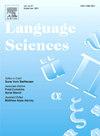命名多样性:Taíno生态语言学和命名惯例,以及对语言回收和非殖民化环境关系的影响
IF 1.1
2区 文学
Q2 EDUCATION & EDUCATIONAL RESEARCH
引用次数: 0
摘要
在经历了几个世纪的种族灭绝和殖民化之后,波多黎各和散居海外的人出现了一场迅速兴起的Taíno复兴运动,同时要求这些岛屿非殖民化的呼声日益高涨。在与Taíno文化重新联系的日益流行的潮流中,作为当前殖民生活方式的一种选择,人们对学习Taíno语言有相当大的兴趣,尽管在当代如何恢复这种沉睡的语言尚不清楚。同样,岛上的人民也认识到恢复与土地之间更传统、更亲密关系的社会生态重要性。为了在Taíno复兴运动中解决这两个问题,本研究侧重于在Taíno语言中为环境命名动态,以此来揭示祖先与环境的关系和概念(环境关系)的细节。本项目使用记录的前殖民时期Taíno生物环境词汇来探索Taíno与前殖民时期生物文化系统相关的语言本体和意识形态。通过关注命名多样性——单个分类群有多个与其相关的名称的程度——本文探讨了Taíno生物文化系统的各个方面如何与Taíno命名约定相关,以及这些趋势揭示了潜在的语言本体和意识形态。与林奈分类相比,Taíno词典显示出命名多样性的总体趋势,更大的生物文化亲密性和功能与更高的命名多样性相关。这些结果表明,Taíno语言回收工作的重要性不仅在于恢复Taíno词汇的记录,而且还在于实现命名多样性的语言意识形态,并为我们周围的环境提供进一步的名称。此外,培养与土地的亲密关系将是在Taíno语言回收和非殖民化我们的环境关系的努力中指导命名实践的组成部分。本文章由计算机程序翻译,如有差异,请以英文原文为准。
Naming multiplicity: Taíno ecolinguistics and naming conventions, and implications for language reclamation and decolonizing environmental relationalities
After centuries of genocide and colonization, there is a burgeoning Taíno resurgence movement in Puerto Rico and the diaspora coinciding with mounting calls for the decolonization of the islands. Within the increasingly popular current of reconnecting with Taíno culture as an alternative to present colonial lifeways, there is considerable interest in learning Taíno language, although it remains unclear how to reclaim such a sleeping language in contemporary times. Likewise, people on the islands are recognizing the social-ecological importance of returning to more traditional, intimate relations with the lands. Addressing both of these interests within the Taíno resurgence movement, this study focuses on naming dynamics for the environment within Taíno language as a way to reveal details about ancestral relations with and conceptions of the environment (environmental relationalities). This project uses the recorded pre-colonial Taíno lexicon for the biotic environment to explore Taíno language ontologies and ideologies in relation to pre-colonial biocultural systems. By focusing on naming multiplicity – the degree to which individual taxa have multiple names associated with them – this paper explores how various aspects of Taíno biocultural systems relate to Taíno naming conventions, and what those trends reveal about the underlying language ontologies and ideologies. The Taíno lexicon shows an overall trend towards naming multiplicity when compared to Linnaean classifications, with greater biocultural intimacy and functionality being associated with higher naming multiplicity. These results indicate the importance of Taíno language reclamation efforts not just reviving the Taíno lexicon as it was recorded, but also operationalizing the language ideology of naming multiplicity and giving further name to the environment around us. Furthermore, cultivating intimate relations with the land will be integral for guiding naming practices within such efforts toward Taíno language reclamation and decolonizing our environmental relationalities.
求助全文
通过发布文献求助,成功后即可免费获取论文全文。
去求助
来源期刊

Language Sciences
Multiple-
CiteScore
2.90
自引率
0.00%
发文量
38
期刊介绍:
Language Sciences is a forum for debate, conducted so as to be of interest to the widest possible audience, on conceptual and theoretical issues in the various branches of general linguistics. The journal is also concerned with bringing to linguists attention current thinking about language within disciplines other than linguistics itself; relevant contributions from anthropologists, philosophers, psychologists and sociologists, among others, will be warmly received. In addition, the Editor is particularly keen to encourage the submission of essays on topics in the history and philosophy of language studies, and review articles discussing the import of significant recent works on language and linguistics.
 求助内容:
求助内容: 应助结果提醒方式:
应助结果提醒方式:


